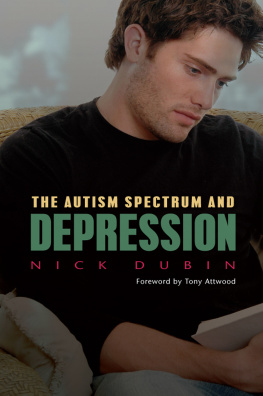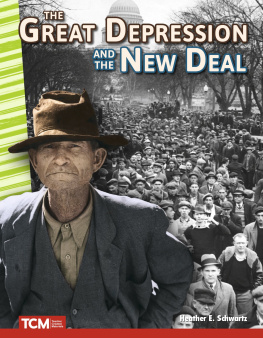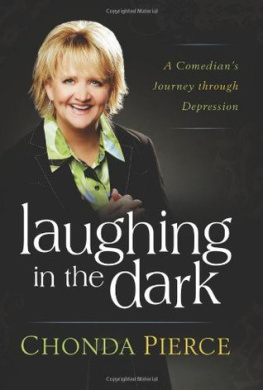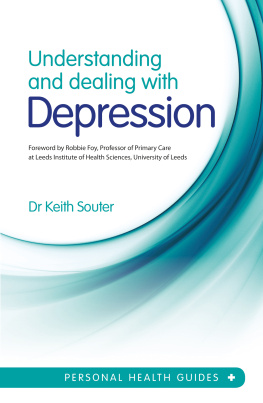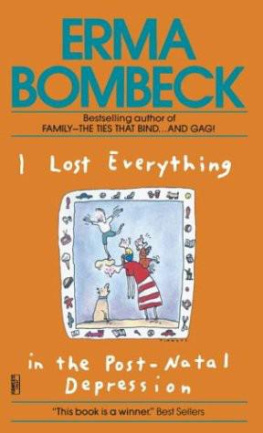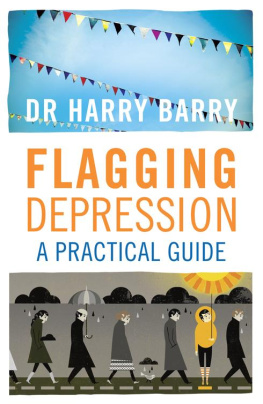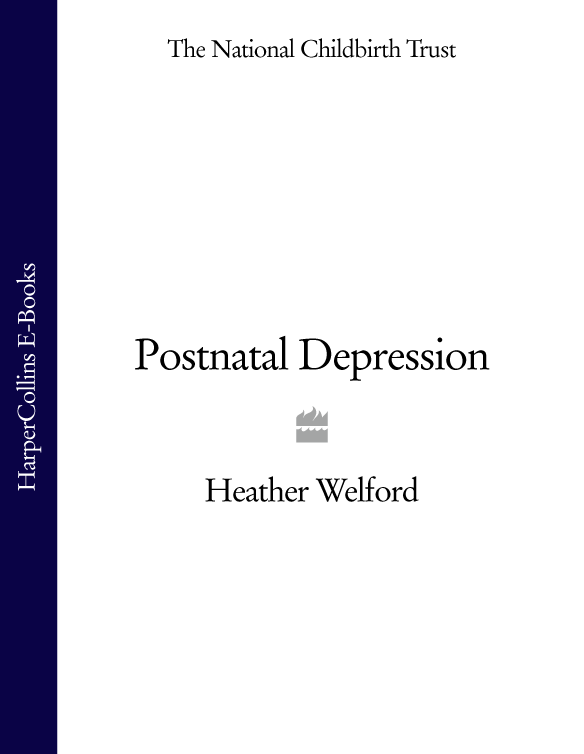NCT Book of
Postnatal Depression
Helping you Through a Difficult Time
Heather Welford

Contents
I am delighted to have been asked to write the foreword to this book. Anyone reading this who has suffered from postnatal depression will know what a frightening and debilitating illness it is.
I myself suffered severe depression when my son Matthew was born nine years ago and although I cant prevent it happening to others, I can talk about my own experiences and where I found the most help.
Postnatal depression can manifest itself in many ways and some symptoms are harder to detect than others. The worst thing a woman can do is to remain silent about how ill they feel. Postnatal depression is the major maternal illness and we must all help to remove the stigma that is still attached to any form of mental illness. It is not your fault. You should not feel guilty. You must seek help.
My own illness began with a series of panic attacks which were incredibly frightening and were completely alien to me. Then, over the next two days (this is all in the first week after delivery), the most terrible black depression descended on me. I lost all interest in the baby. I lost all sense of reality. I had a desperate childlike need for my mum. I basically had what was a nervous breakdown. I also had a beautiful baby, a lovely home, money in the bank, and a supportive husband, so let no-one tell you that depression only affects women living alone in a tenement block. It doesnt care who it hits. I had the most wonderful pregnancy. I was healthy, happy, and flowing with excitement and anticipation. If it can happen to me it can happen to anyone.
However, if you are reading this whilst suffering from postnatal depression or you are close to someone who is, remember you will get better. Those around you need to tell you that every day. Dont be afraid of anti-depressants. They are non-addictive and they help you to see the light at the end of the tunnel. If you feel a lack of emotion, particularly towards your child, dont worry: your natural feelings will return.
Postnatal depression in a family is incredibly frightening both for the woman suffering and for those who love her. But with medical care and a supportive family she will get better. It does take time and there are many different treatments, but you will find something that works for you. I found that talking to other women who had suffered and recovered was a huge help to me: there are organisations all over the country that will help you make those contacts.
Thank goodness for books such as this that will help increase awareness of the illness and will be a huge comfort to those women who are suffering and those people who are caring for a loved one who is ill.
Denise Welch is one of Britains most familiar faces, with roles in Soldier Soldier, Auf Wiedersehen Pet! and Spender to her credit. She can currently be seen as Natalie Horrocks in Coronation Street. Since recovering from postnatal depression after the birth of her first child, she has been heavily involved in charity work for sufferers of the illness.
Postnatal depression is something thats likely to touch all our lives.
You, or your partner, might have experienced it. Or your own mother may have done so. Or perhaps you have a friend, a sister, a neighbour who has suffered. You may be in a position to offer help and support to a postnatally-depressed woman. Whatever the situation, this book will help you gain an understanding and an insight into the causes and effects of this condition.
I am especially pleased that this book has been able to look in some detail at the effect postnatal depression has on two other important groups of people fathers, and the babies themselves. This is newish stuff, and particularly new in a book aimed at non-academic and non-specialist readers. Its not very comfortable reading, either, but I make no apology for that.
Definitions
My research into postnatal depression has shown me that this is not a comfortable issue. Even the definition of postnatal depression brings its own problem. Is it, Ive been asked, an illness? Some commentators and supporters, and mothers themselves, call it postnatal illness, as a way (I think) of drawing attention to the fact that it so often needs treatment and is not a bad mood, but something far worse and, importantly, to the fact that classic clinical depression is only one way the condition shows itself.
But calling postnatal depression an illness implies that its rather similar to some sort of bodily malfunction that arrives out of nowhere, and that you are just unlucky to catch it.
There is an element of sheer misfortune in postnatal depression. And people with it can certainly be desperately ill, especially if they have the more severe forms. But I would never want to ignore the clear social, psychological and emotional factors in its development so Ive stuck with the term postnatal depression.
Motherhood is complex, strange and only partly understood. Its an experience, yet its also a state of being. Once pregnant, we have changed for ever. I think the work of people like Rozsika Parker and Joan Raphael-Leff (see ), who deliver new insights from a more woman-friendly form of psychoanalysis and psychology to the study of mothering, will bring a greater understanding of postnatal depression, and help us see why some women are more likely to experience it. The idea that postnatal depression can be a creative, protective and even necessary response to emotional and social factors was a new one to me.
I have drawn a distinction, based on current clinical consensus, between postnatal depression and puerperal psychosis, and devoted a separate chapter to the latter.
So many people have helped me with this book.
As a journalist and writer in the field of womens health and family issues for 20 years, I have had contact with dozens of women who have had postnatal depression, and I have interviewed women and health professionals for magazine articles on the topic. By keeping up to date with the academic research and witnessing the way that volunteer support can be so effective, I have gained an insight into postnatal depression. Being an NCT member and breastfeeding counsellor and tutor has made me aware of the pioneering work that the NCT has done in postnatal support, with depressed and non-depressed mothers.
Apart from that background, though, I have interviewed at length 18 women and four men about their own experiences. I cant name them, as confidentiality was agreed as a condition. The names in Chapter 5 are pseudonyms. Where I have used real names, the owners have already gone public in printed interviews.
The frankness and honesty of everyone I spoke to have been very valuable. My thanks to all of them.
Thanks also to Sue Orchard, chair of NCTs postnatal committee, for her wide-ranging support.
MIDIRS the Midwives Information and Resource Service have been their usual efficient and helpful selves in supplying literature searches and research papers.
I should also add a word of praise for New Generation, the NCTs own quarterly journal. Now I know why I have never thrown a copy away here was a brilliant source of thoughtful, insightful and honest personal experiences going back 15 years. Any idea about postnatal depression you or anyone else might ever have had, somewhere in


